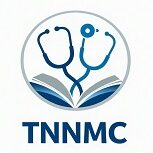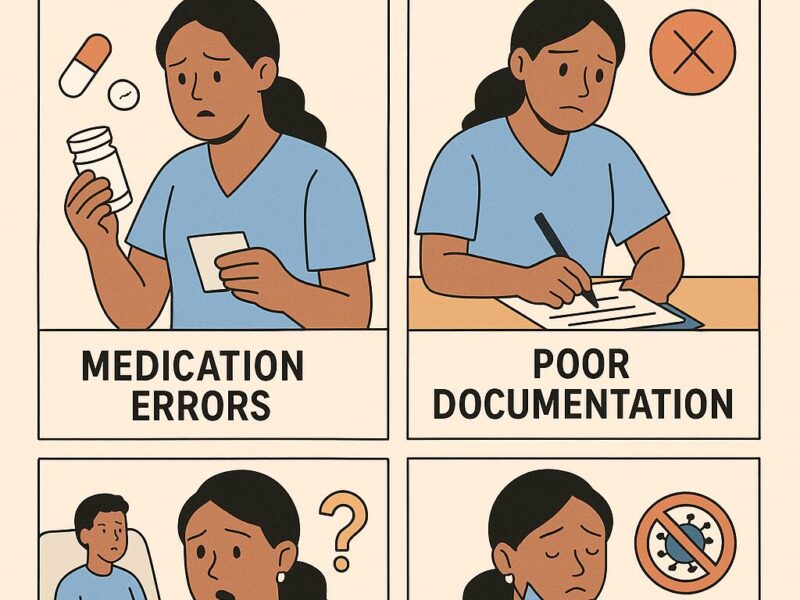Indeed, the profession of nursing is a pillar of the modern healthcare framework, with a career path characterized by that at once most regrettably common yet most personally gratifying and socially impactful combination of high-demand, high-involvement, and high-impact work. As healthcare becomes more complex and comprehensive, the educational pathways for the next generation of nurses have taken on increased importance.
The Associate Degree in Nursing (ADN) and Bachelor of Science in Nursing (BSN) are the two most common routes to enter the nursing profession and become a Registered Nurse (RN). This decision is crucial, as it can determine the path one takes professionally, potentially impacting the career path, earning potential, and overall job satisfaction. So, to be prepared for your next healthcare path, understanding the nuances of each degree is key.

Associate Degree in Nursing (ADN): Your Ticket to Becoming an RN in Record Time
Often called the Associate Degree in Nursing (ADN), and sometimes the Associate of Science in Nursing (ASN) or Associate of Applied Science in Nursing (AASN) depending on the institution, this entry-level nursing degree will give students the basic knowledge and skills needed to start a career as a registered nurse.
An ADN program is a two-year commitment, covering four semesters of full-time coursework. But if you’re looking for a quicker route into the profession, a small number of institutions offer accelerated programs that can be completed in as little as 16 to 18 months.
These are mostly offered by community colleges and hospital-based nursing schools and have an incredibly accessible option in some communities.
When it comes to ADN programs, the curriculum is specifically tailored to teach you all the fundamental nursing concepts and clinical skills necessary to practice as an entry-level RN.
Undergraduate nursing programs offer courses in areas such as nursing fundamentals, anatomy, physiology, microbiology and pharmacology that form the basis of science for nursing practice. Additionally, the program covers the details of medical-surgical nursing, the content of pediatric nursing, community nursing in the context of public health, and details related to psychiatric nursing, preparing graduates with a comprehensive understanding of diverse patient care across varying demographics and healthcare settings.
The focus of these programs is much more skewed towards applicability and the development of hands-on skills, which are then immediately transferred into the workforce.
The emphasis on concentrated training means that graduates will be prepared to meet the urgent needs of many healthcare settings in a shorter time frame, making them attractive hiring candidates.
These accelerated programs will cover the same number of subjects in a shorter period of time and might therefore delve less into some of the theoretical underpinnings and other areas of healthcare philosophy than would be covered in a four year BSN program.
Clinical training is an essential part of any ADN program, with over 500 supervised clinical hours in multiple healthcare environments. These experiential learning environments — from hospitals to long-term care facilities to community health organizations — give students invaluable opportunities to apply classroom knowledge in actual patient-care situations.
Such diversity of these settings allows nursing students to be exposed to various nursing roles as well as various patient populations, making them more adaptable with a broader understanding of the profession.
The number of clinical hours required for licensure is state dependent, so students should check the requirements of their state’s board of nursing. As they provide basic nursing care in direct observation of seasoned nurses, ADN students gain hands-on skills and confidence.
Cost is a big consideration for people interested in an ADN program. ADN programs are typically more affordable than BSN programs. Tuition is typically around $6,000 to $20,000 for the entirety of the program in public schools.
These costs can range anywhere from $3000-$17,000 on a yearly bases. The amount you pay varies based on the type of institution (public vs. private), whether you are considered a resident or not, and any extra fees required to use on-campus resources and facilities.
ADN programs are also significantly less expensive than other nursing programs, making them a great option for individuals on a budget or those looking to keep their student loans to a minimum. Such affordability allows more aspiring health care professionals to explore a nursing career.
Although ADN programs tend to be lower priced, eligible students can still receive financial aid. Federal and state financial aid—including grants and loans—can help cover the cost of education.
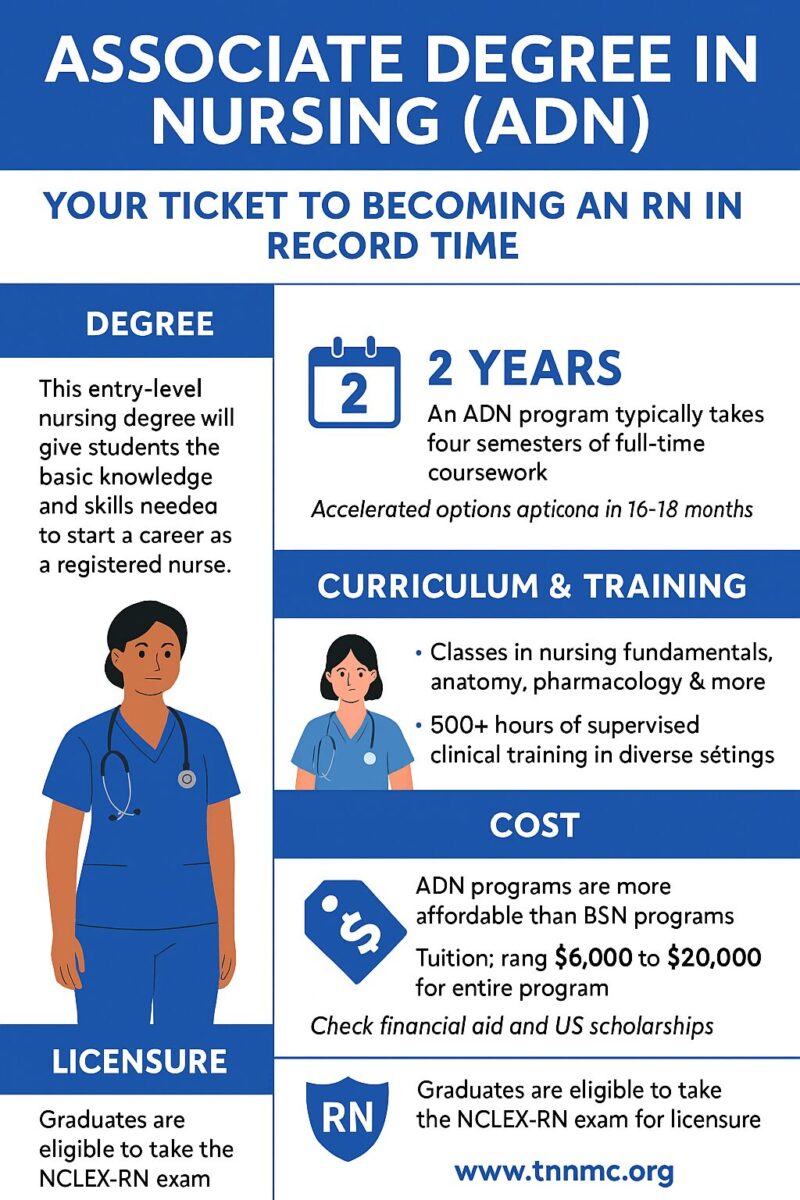
Also check out nursing-specific scholarships, and loan repayment programs offered by organizations like the Nurse Corps and private foundations. These resources can really lower how much money out of pocket you have to pay for an ADN education, making it an even more financially friendly route to becoming a registered nurse.
Most importantly, after completion of an accredited ADN program, graduates may sit for the NCLEX-RN, the National Council Licensure Examination for Registered Nurses. You must pass this exam in order to be licensed as a registered nurse. Thus, an ADN is the basic educational path that prepares graduates to take the licensure examination to be a registered nurse (RN) and start a career in nursing.
Nursing Degrees — Bachelor of Science in Nursing (BSN)
Bachelor of Science in Nursing (BSN) is a four-year undergraduate degree program providing a more widespread and profound education in the field of nursing. Generally these programs are offered by four-year colleges and universities and include a more comprehensive education along with a professional nursing education.
While the typical BSN program is eight semesters, or four years, many colleges also offer an accelerated BSN program for those who already have a bachelor’s degree in any field or have a large number of transferable college credits. These can usually be done in a shortened period — around 15 to 39 months.
BSN programs have more advanced curricula, expanding on what students learned in ADN programs and offering a more in-depth view of the nursing profession.
The curriculum for a BSN can add to the core clinical skills of ADN programs with advanced concepts relevant to the nursing industry, such as nursing theory and research methodologies, as well as coursework in leadership principles and healthcare management, public health concepts, ethical considerations, pathophysiology, and nursing informatics.
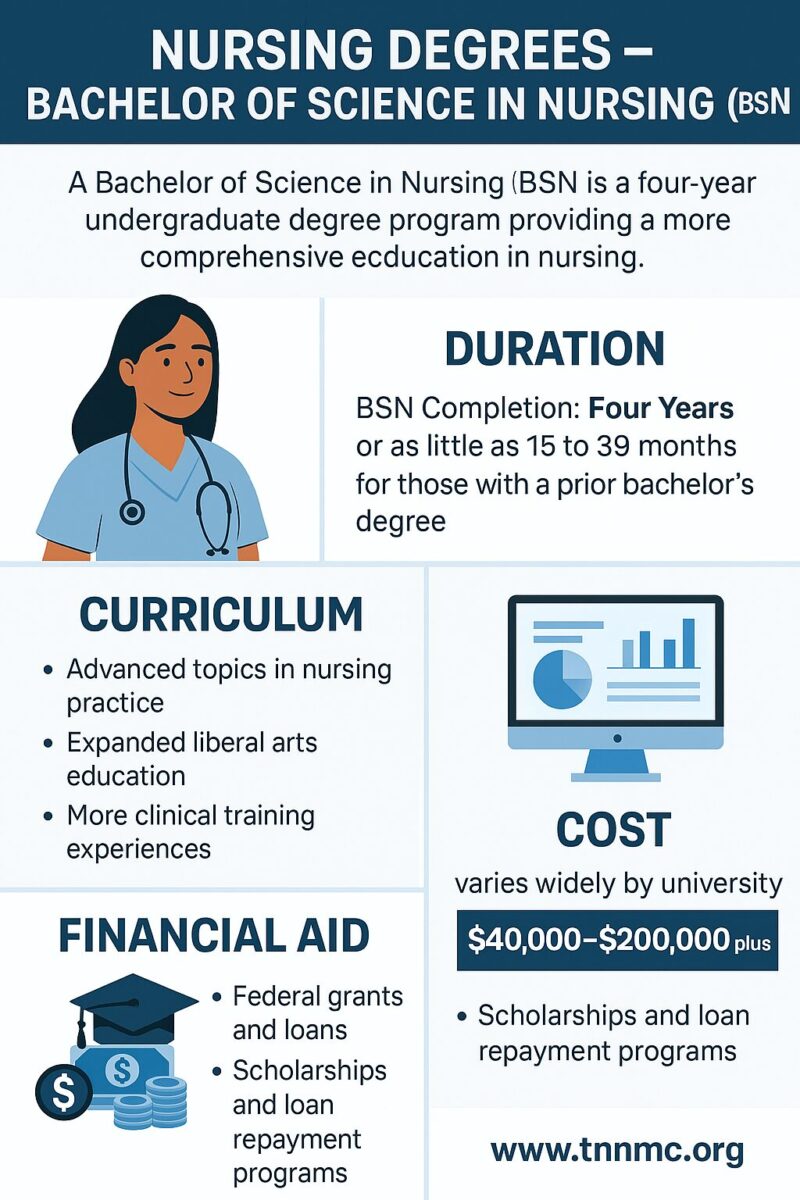
BSN programs usually include broader liberal arts and sciences subjects, promoting critical thinking, communication abilities, and a diverse worldview. Such an education covers a wider ground, allowing graduates to develop skills that enable them to engage in more complex healthcare settings and lead in the future.
The arrangement of one additional year for the programs assists in covering and better comprehending the hypothesis behind the ideas, more on the analysis methods that help support research, which gives a stage for evidence-based practice.
Clinical training in BSN programs is also more comprehensive, exposing students to a greater variety of experiences in a broader range of health care settings. These experiences often involve more focused training and provide exposure to a wider array of nursing roles in hospitals, clinics, and community health organizations.
BSN programs place more emphasis on clinical hours and environments, enabling students to develop more competitive clinical skills and knowledge in different nursing specializations. Having a wider range of clinical exposure makes for a more adaptable and versatile nursing professional.
Deciding to pursue a BSN degree is a significant investment in one’s future. In general, BSN programs cost more than ADN programs.
BSN Completion: Four Years The cost of a four-year BSN program varies widely by university, ranging from $40,000–more than $200,000. Annual tuition can range from about $6,000 to well over $60,000.
These costs vary based on factors, including the institution type (public vs. private), residency status, and program format (traditional or accelerated).
The larger investment in a BSN indicates a more thorough education and resources typically offered at four-year institutions. That said, it’s a significant investment, and one that should be weighed against the potential long-range career and income benefits.
However, note that there are several financial aid alternatives available to help pay for a BSN program, despite the higher tuition costs. BSN students qualify for federal and state financial aid, including grants and loans, the same as ADN programs.
Also, many nursing-specific scholarships and loan repayment programs are available through organizations like the Nurse Corps and a number of private foundations. This financial support could open the door to BSN education for many, reducing the financial strain of a larger degree program.
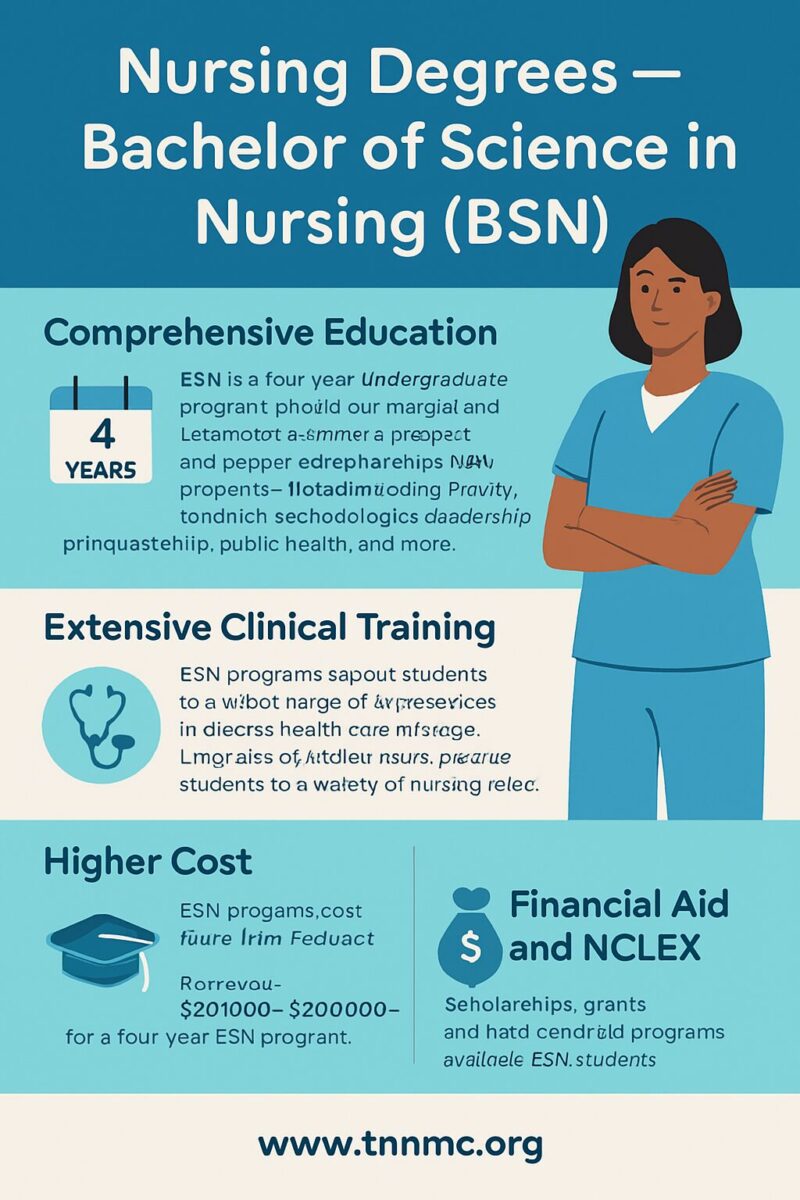
Accredited BSN program graduates can also pursue NCLEX-RN licensure. For instance, BSN programs tend to have higher NCLEX pass rates than ADN programs.
This could be due to a more holistic curriculum and an increased focus on critical thinking and evidence-based practice in BSN programs.
This further indicates that BSN candidates are more likely to be prepared for licensure as BSN programs focus on clinical practice, community health and education.
The Differences Explained: ADN vs. BSN
To help explain the differences between an ADN and a BSN, here is a table outlining the critical differences between the two across a number of key features:
| Feature | ADN | BSN |
|---|---|---|
| Duration | 2 years | 4 years |
| Type of School | Community College, Hospital | University/College |
| Curriculum Focus | Technical Skills, Basic Patient Care | Broader Theory, Leadership, Research |
| Cost | Lower | Higher |
| NCLEX Eligibility | Yes | Yes |
| Job Opportunities | Entry-level RN roles | Broader roles, Leadership Potential |
| Long-Term Salary Potential | Moderate | Higher |
| Advancement Options | Limited | Advanced practice, Management, Public Health |
| Employer Preference | Acceptable | Increasingly Preferred |
Both ADN and BSN degrees qualify candidates to take the NCLEX-RN and work as registered nurses; however, the career options and responsibilities can vary.
ADN Registered Nurses generally emphasize on the hands-on clinical skills and daily-level patient care necessary for entry-level positions.
This job can be conducted in many healthcare settings, such as hospitals, clinics, nursing homes, and home healthcare agencies.
ADN-prepared nurses frequently perform patient health histories, administer medications, assist with physician examinations and procedures, order simple diagnostic tests, and provide basic patient education and care.
This route provides a more streamlined path to clinical work and allows you to enter the nursing field quickly.
On the other hand, BSN-prepared nurses are also eligible for entry-level RN roles, albeit with a more comprehensive scope of practice, thus, they may be prioritized for more demanding patient cases and more acclaimed healthcare settings.
Moreover, the DNP’s advanced education prepares them with a greater comprehension of research designs and evidence-based practices, making them more qualified for leadership opportunities and participation in quality improvement endeavors in health care organizations.
The enriched curriculum prepares BSN recipients to strengthen their critical thinking and decision-making skills, enhancing their ability to work in evolving, complex healthcare environments.
The two-degree paths also diverge significantly in salary expectations, especially in the long term. Average starting salaries for ADN nurses may be slightly less than those of a BSN nurse, but the BLS doesn’t ever break down the salaries of RNs based on whether they have an ADN or a BSN.
But other data sources, including ZipRecruiter and Nurse. org, ADN nurses average about $77,000 annually. These sources referenced an average annual salary for BSN nurses, which is a high of around $90,000 and a low of followed by about $104,000.
Generally, BSN-prepared nurses have higher longterm earning potential as their education allows them to qualify for career advancement into specialized and leadership roles that tend to be accompanied by higher salaries. Other reports even note that BSN nurses may make hundreds of thousands more compared to ADN nurses over the 30-year span of his or her career.
For career advancement, nurse that has a BSN normally have more opportunities. ADN nurses may experience on-the-job learning opportunities and could focus on certain areas, but educationally a BSN often becomes the bare minimum requirement for a leadership or management role.
Planning on furthering your nursing education, such as obtaining your Master of Science in Nursing (MSN), Doctor of Nursing Practice (DNP), or Doctor of Philosophy in Nursing (PhD), requires a BSN as a foundation. For many, such degrees and certifications can translate into more opportunity and income.
BSN graduates are less likely to limited by less desirable roles mainly in hospital settings, the degree opens many avenues in other fields like, nursing research, public health, and nursing education.

Finally, employer preference is becoming an increasingly influential factor in the nursing job market. It is amateurish however for the individual RN to demand or insist an employer of a BSN or a higher degree in nursing to work as a RN — this is gross generalization and the ultimatums factor in typically should be avoided when schooled to care professions.
This preference is confirmed by the realization that BSN graduates tend to have a more in-depth education that correlates with better patient outcomes and preparation to meet the demands of the current health care climate.
Salary and Career Outlook: What to Anticipate With Each Degree
When pursuing nursing, one should consider the potential salary and career trajectories associated with each degree. According to the U.S. Bureau of Labor Statistics (BLS), the median annual wage for all registered nurses was about $86,070 in May 2023.
Remember that this number represents the median for all RNs in the field, not necessarily distinguishing between ADN and BSN.
Other sources, though, provide more nuanced detail. For example, ZipRecruiter shows the average annual salary for ADN nurses is approximately $77,000, and their data indicates that BSN nurses average a salary anywhere between $90,000 and $104,000 per year.
Similarly, Nurse. org found in its salary survey that nurses with a BSN, on average, make more per hour than nurses with an ADN.
Reports for compensation from Medscape also offer great statistics, Detailed information may include variations in salary based on factors such as education type, years of experience in the field, geographic region, and type of practice setting.
Though the reporting agencies may have slight variations in their figures, the trend remains the same: a BSN-prepared nurse typically can expect a higher starting salary than an ADN nurse.
That difference likely reflects the weight employers give to the additional education and broader skill set a BSN program provides.
As a so-called predictor of success within the healthcare field, nursing income and anything else related to nurse professional jobs are largely driven by education level held.
ADN and BSN nurses can overcome this slump in earning potential by factors like years of experience, specialization in a specific field of nursing and furthering their education.
The BSN Degree is often the gateway to advanced nursing roles with the highest salaries.
Earning a BSN is typically a prerequisite for graduate-level education leading to specialization as a nurse practitioner, clinical nurse specialist, nurse manager, or nurse educator.
These more advanced professional roles and supervisory and managerial positions all come with the potential for substantially higher salaries compared to entry-level RN roles.
So while an ADN can lay a strong foundation for a nursing career, the highest levels of compensation and career fulfillment require a BSN, or even higher degrees.
ADN and BSN prepared nurses can be found working in many, many different types of healthcare settings. These environments range from general medical and surgical hospitals, physicians’ offices, home healthcare agencies, nursing and residential care facilities, outpatient care centers, and educational institutions.
But it’s worth noting that many employers nowadays, especially larger healthcare systems and those with Magnet recognition, may only be hiring BSN nurses, and that can apply to specialized units within a hospital (think intensive care or cardiac care) and government facilities, such as VA hospitals and the military.
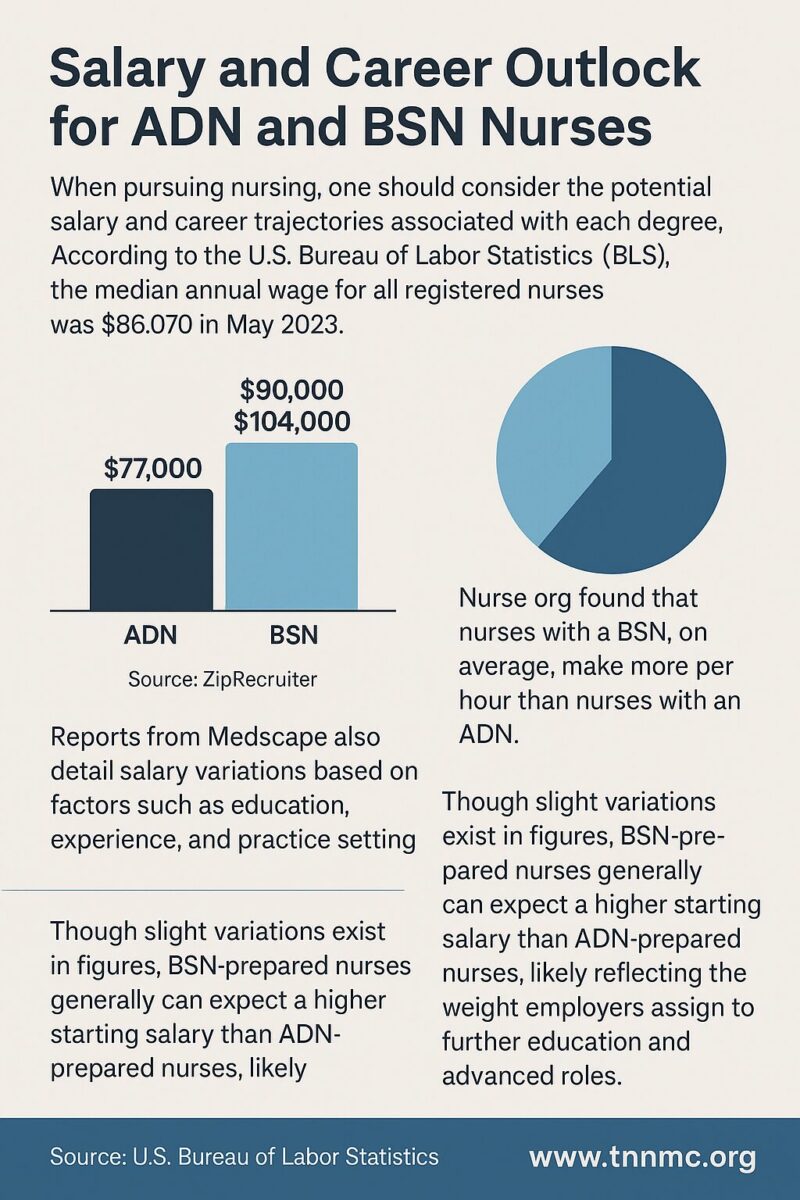
Moreover, many leadership and administrative positions in all these environments require or highly prefer candidates with a BSN degree. So, both paths lead to a career as a registered nurse with many potential employers, and a BSN can expand the playing field for available opportunities, particularly in more competitive and specialized areas of nursing.
Current Employer Trends and Industry Trends
Aspiring nurses need to understand the common trends among healthcare employers and the expectations of the nursing industry when assessing educational pathways.
Magnet hospitals are one of the biggest factors in hiring preferences. ANCC Magnet recognition is one of the highest honors awarded to hospitals, recognizing them as meeting elite standards for professional nursing excellence.
These hospitals are known for their positive and empowering work environments for nurses, which result in better patient outcomes and increased nurse satisfaction. One of the main components of achieving and maintaining your Magnet status is that a significant percentage of your staff consists of BSN-prepared nurses, especially those with leadership and nurse manager roles.
Although all Magnet hospitals do not require that every staff nurse has a BSN, there tends to be quite the demand for nurses with bachelor’s degrees since the program emphasizes continuous learning, professional development, and evidence-based practice. There is a virtually unbeatable route for nurses hoping to work in these prestigious facilities or climb the ranks and fill leadership positions within them: get a BSN.
Position statements from influential healthcare organizations further highlight the increasing significance of baccalaureate nursing education.
The Institute of Medicine (now the National Academy of Medicine) previously called for a dramatic increase in the percentage of BSN-prepared nurses in the workforce, setting a goal of 80%.
Furthermore, since their inception, the American Association of Colleges of Nursing (AACN), representing baccalaureate and graduate degree education, has continuously advocated for baccalaureate education as the minimum preparation for professional nursing practice.
As the national voice for nursing education, the AACN establishes quality standards and advocates for policies that improve healthcare. It strongly recommends that registered nurses be prepared at the baccalaureate level.
These recommendations from expert organizations indicate a widespread agreement among members of the healthcare community that BSN programs offer a more robust level of education giving nurses the tools they need to understand the expanding complexity of healthcare and to care for patients more effectively.
In line with these industry trends and recommendations, the vast majority of prominent hospitals and health care systems throughout the United States are hiring exclusively applicants with BSN training for registered nurse positions.
While ADN graduates can still secure employment, individuals with bachelor’s degrees typically have an advantage. Aspiring nurses should also familiarize themselves with the hiring process of the hospitals or healthcare organizations they wish to work for by researching the qualifications they look for and the educational expectations they have.
A BSN can also significantly increase nurses’ opportunities to advance into leadership and specialty practice areas. Many leadership roles, including charge nurse, nurse manager, assistant director of nursing, and chief nursing officer, require a BSN as a baseline qualification.
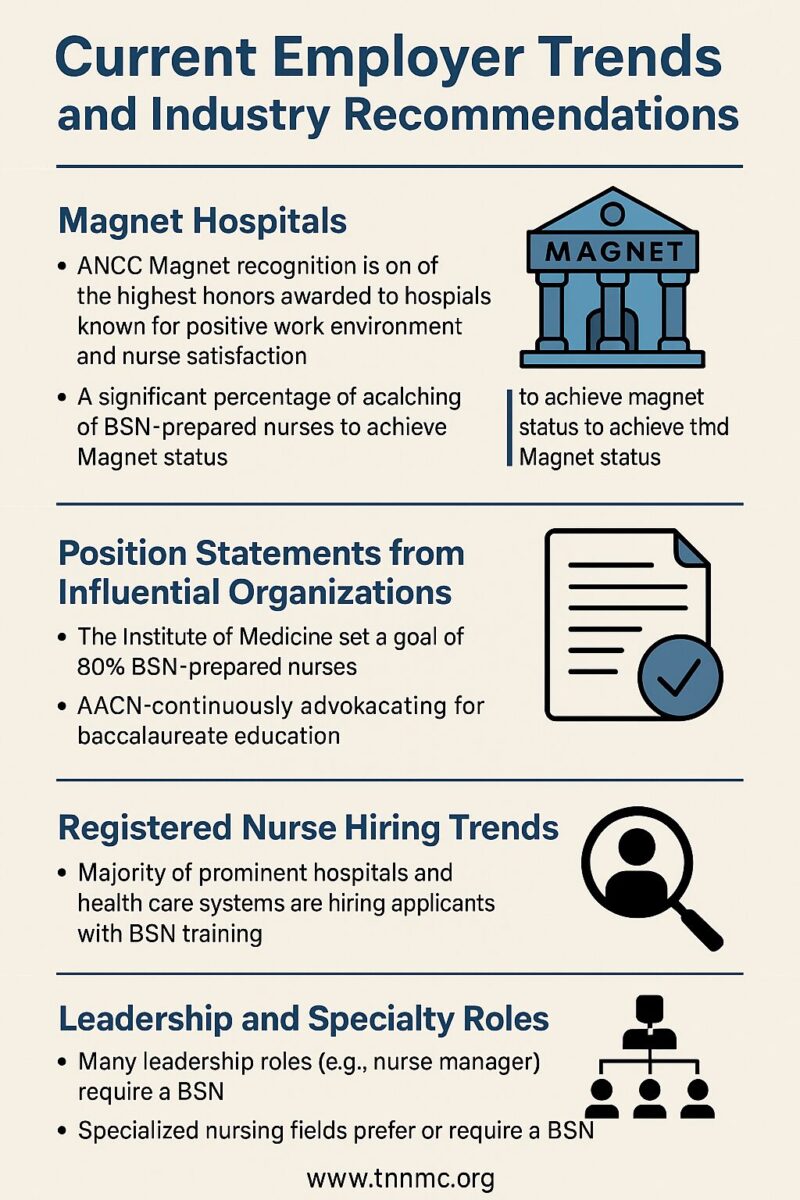
For example, many specialized nursing roles such as case manager, informatics nurse, public health nurse, research nurse and nurse educator, travel nurse, etc., prefer or often require a BSN because of the advanced skill level of those positions. Thus, a BSN degree is a valuable asset and helps nurses to have a greater choice of career options, especially nurses who want to advance to leadership positions or in specialized fields.
Choose Carefully: Which Nursing Degree is Right For You?
The decision to pursue the nursing degree path that is right for you, will ultimately be up to you, although it will be based on an evaluation of your goals, circumstances and aspirations.
Earning an associate degree in nursing (ADN) may be the best option for those who want to join the nursing workforce and start working as registered nurses quickly (undoubtedly for personal or financial reasons).
One Year College Degrees: The Brightest New Option The most appealing aspect is that they are relatively inexpensive, making them a unique educational approach to those experiencing financial constraints.
In addition, an Associate Degree in Nursing can be a stepping stone for those who wish to work as an RN in their first job before completing a Bachelor of Science in Nursing (BSN) as part of an RN-to-BSN bridge program.
In contrast, the Bachelor of Science in Nursing (BSN) program is usually the ideal option for those seeking more varied career paths and higher potential for nursing career growth in the long run.
The BSN is associated with greater opportunities for those hoping to assume leadership and administrative responsibilities within the nursing field. It is often a requirement as well for employment at large hospitals or healthcare systems that favor BSN-prepared nurses, such as Magnet-designated facilities.
In addition, a BSN is often a mandatory qualification for nurses who want to focus on specialized areas of nursing that require a higher level of knowledge and critical thinking.
RN-to-BSN bridge programmes are a great option for ADN graduates looking to advance their education. Such programmes are designed to take the knowledge and experience that ADN-prepared nurses already have and allow the nurse to achieve a bachelor’s degree in a more efficient and often abbreviated timeframe.
Because many RN-to-BSN programs are online, working nurses can manage their professional responsibilities and studies.
Online BSN completion programs are also becoming more prevalent, which is great news for registered nurses who completed an ADN and are seeking flexibility in obtaining the BSN.

These programs are tailored to meet the needs of busy working professionals. They provide flexibility and online coursework that allows nurses to complete the material when it’s most convenient for them. This enables RNs to continue to work while continuing schooling without having to break up their employment.
Final Thoughts: It All Starts Here, Your Path to a Fulfilling Nursing Career
An Associate Degree in Nursing (ADN) and a Bachelor of Science in Nursing (BSN) are both highly regarded and accepted routes to becoming a registered nurse and building a fulfilling career centered around patient care. The best choice between these two paths is, of course, a personal one and can depend on an individual’s unique circumstances, career goals, financial situation and long-term career plans. Future nurses should consider each degree type’s advantages and disadvantages based on their circumstances and career goals.
Action Steps: Find Programs, Compare Options, Get Started
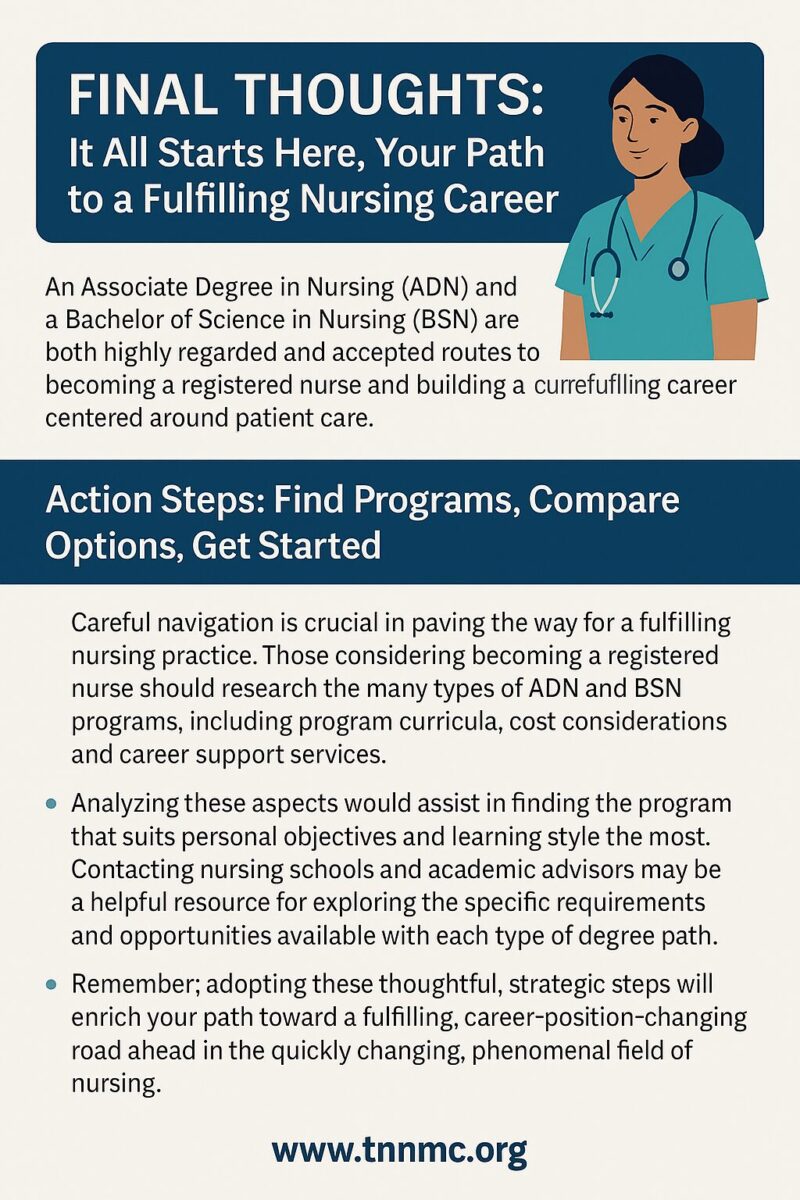
Careful navigation is crucial in paving the way for a fulfilling nursing practice. Those considering becoming a registered nurse should research the many types of ADN and BSN programs, including program curricula, cost considerations and career support services.
Analyzing these aspects would assist in finding the program that suits personal objectives and learning style the most. Contacting nursing schools and academic advisors may be a helpful resource for exploring the specific requirements and opportunities available with each type of degree path.
Remember: adopting these thoughtful, strategic steps will enrich your path toward a fulfilling, career-position-changing road ahead in the quickly changing, phenomenal field of nursing.
